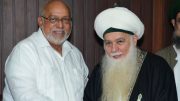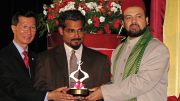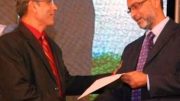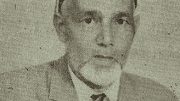Historic would be too mild a word to describe the “Journey in Faiths” event held in Bridgetown, the UNESCO inscribed heritage capital city of Barbados. It was truly a wonderful and moving experience to join 300 people from diverse faith backgrounds in a walk that linked the Muslim, Jewish, Christian and Rastafarian places of worship in the city.
The “Journey in Faiths” walk took place on Monday, June 17, 2019, and served as the launch of the ‘Abrahamic Faiths Conference’, a two-day gathering organized by Codrington College in partnership with the Ministry of People Empowerment and Elder Affairs (with responsibility for Ecclesiastical Affairs). (Barbados Today Online Report can be accessed at this link).
The walk began at the ‘City Mosque’ in Sobers Lane on a lovely, windy morning under slightly overcast skies. Some people sat on chairs while the young sat on the floor of the carpeted mosque to listen to Sabir Nakhuda explain the history of the Muslim community in Barbados. The young Imam, Mohammed Mamadh, delivered a moving prayer for peace and security in both English and Arabic.
The Minister of People Empowerment and Elder Affairs (with responsibility for Ecclesiastical Affairs), the Honourable Cynthia Forde, led the walk.
Christians and Muslim school-age children and their teachers were accompanied by representatives from other faith groups as well as dignitaries such as the Bishop of Barbados, Reverend Michael Maxwell, and the head of the United Nations in Barbados.
Members of the Cadets and Minister Forde, along with a number of officials, led everyone in unison to the Synagogue – the oldest in the western hemisphere with a rich history that warrants further research. The local Jewish representative and the official tour guide welcomed everyone and explained the history of the Jewish community in Barbados spanning nearly 400 years. The number of Jews in Barbados is relatively small – no more than 50 members – but their roots go deep into the soil of the island.
From the Synagogue, we walked next to St. Michael’s Cathedral. Through the narrow streets, shop owners and the curious looked at what might just be a turning point in the history of Barbados – people with little in common other than their shared human experience – walking shoulder to shoulder, seeking only peace in their nation.
We were welcomed to the Cathedral and listened to a talk that covered the history and architecture of the Cathedral and of Christianity on the island.
The final leg of our walk took us to Queen’s Park, a place of peace and serenity, surrounded by the noise and clutter in the heart of the city. We were welcomed by members of the Rastafari community who embrace the “Steel Shed” at Queen’s Park as their own sacred space. We sat attentively in the very hall where Marcus Garvey once spoke. As members of the Rastafari community played their drums, we listened to Ras Iral explain the core beliefs of the Rastafari Nyahbinghi Order, the oldest of all the Rastafari mansions that is named after Queen Nyahbingi, a 19th-century Ugandan ruler who fought against the British Empire.
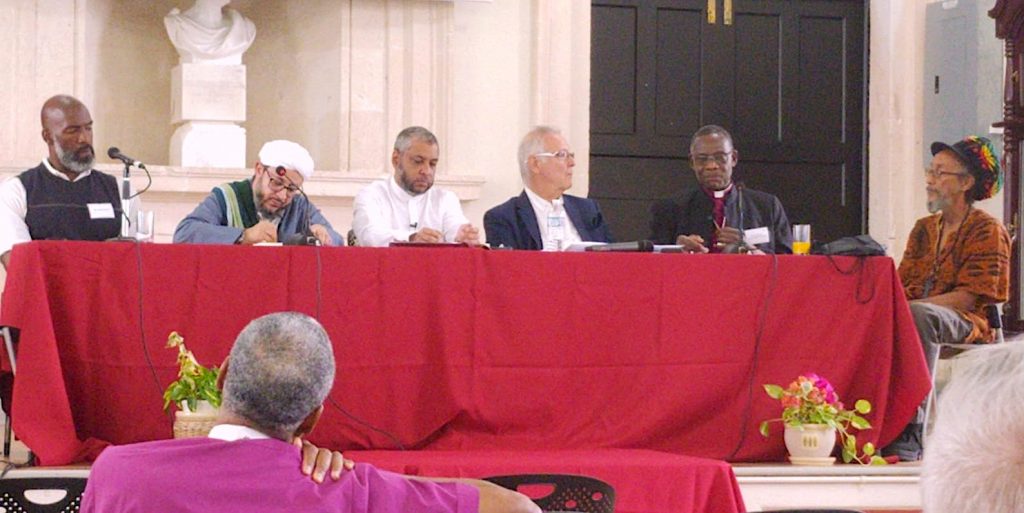
Panel discussion at Codrington College titled: “Working Together for Peace: Building on our Common Faith Foundation.”
To close the event, three young Barbadians, representing Judaism (Tyuh Manning), Christianity (Zera Yaicob Yaicob), and Islam (Khaleel Kothdiwala), addressed the elders in a fervent plea for peace and security for all the citizens of their nation. In their communique, hand-delivered to Minister Forde and the Principal of Codrington College, Rev. Dr. Michael Clarke, the two young men, and one young woman described all of humanity as having sprung from a common source and from a common ancestral heritage. They reminded those in attendance including the media, that our creation into nations and tribes is for us to know and understand each other and not to war with one another.
Their communique sadly acknowledged that many of the world’s conflicts have their genesis in the abuse and misuse of sacred religious texts. “When sound leadership is absent at all levels in society, decay sets in,” said one of the presenters.
Drawing upon their respective faith-based teachings and traditions the youth challenged the audience to use their faiths as conduits to peace in their communities and to encourage their members to embrace a common understanding and mutual respect for each other.
At the end of the ‘Journey in Faiths’ walk, the faces of the young participants reflected excitement and joy from the fact that they were part of an auspicious event in the history of their nation. For the majority of those who joined in the walk, this was their first time in a sacred place that was not of their own.
Organizers said they hope that those who participated would begin to recognize the multi-faith nature of Barbadian society and the need for members of faith communities to lock arms and work for the common good of all citizens of Barbados.
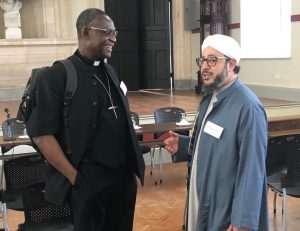
Archbishop Josiah Idowu-Fearon with Shaykh Ahmad Saad
Archbishop Josiah Idowu-Fearon, Rabbi Thomas Salamon and Shaykh Ahmad Saad arrived after the walk and when told what had transpired prior to their arrival, they all applauded the initiative on grounds that while religions don’t converse, it followers do and can have conversations.
The subsequent two days of the Conference at the scenic and historic Codrington College (the first Christian Seminary in the western hemisphere) reinforced the need to have candid conversations not only about what unites faith communities, but also what differentiates them.
Rabbi Thomas, Shaykh Saad, Archbishop Idowu-Fearon and Ras Iral of the Rastafari community, engaged in a series of conversations about their beliefs and what it means to coexist peacefully in spite of their differences.
The Archbishop spoke eloquently about his experience in Northern Nigeria where he has worked tirelessly to bridge the gap between Christians and Muslims and tackle challenges affecting members of both communities. In one of his talks, he said that during the independence celebration of Nigeria, faith leaders met and one of them said “let’s forget our differences” and another responded, “no, let’s understand our differences”.
Shaykh Saad reinforced the Prophetic model that a ‘good Muslim is and should be a good human being’. He said the two things are not separate entities and on that basis, respect for others is as important as the respect we demand for ourselves.
At the end of the two days, it was evident that dialogue, discussions, conversations, and connections can in fact save communities. Conversations around peaceful coexistence need to happen more frequently. Shaykh Saad delivered the call to Zuhr (noon) prayer on the second day of the Conference and as his remarkable voice echoed through the halls of Codrington College, Principal Michael Clarke said it marked the first time that a call other than the customary ringing of the bell was sounded since the inception of the college in 1745.
The Abrahamic Faiths Conference, the presence of a Rabbi, an Archbishop, and a Shaykh, along with the “Journey in Faiths” event, set the foundation for future discourses and mutual cooperation on challenges that affect all the citizens of Barbados.
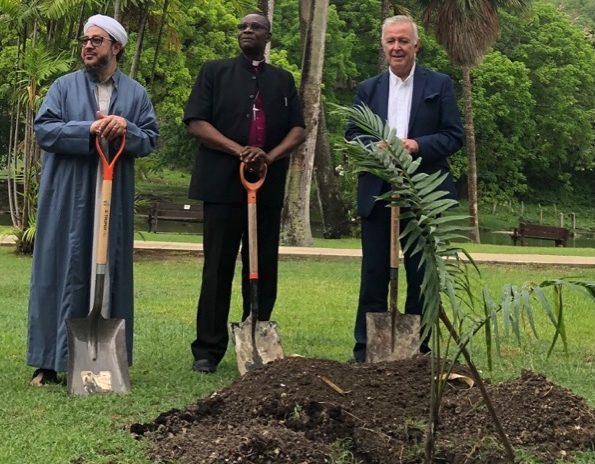
Tree planting by Archbishop Josiah Idowu-Fearon, Rabbi Thomas Salamon and Shaykh Ahmad Saad to commemorate the event












